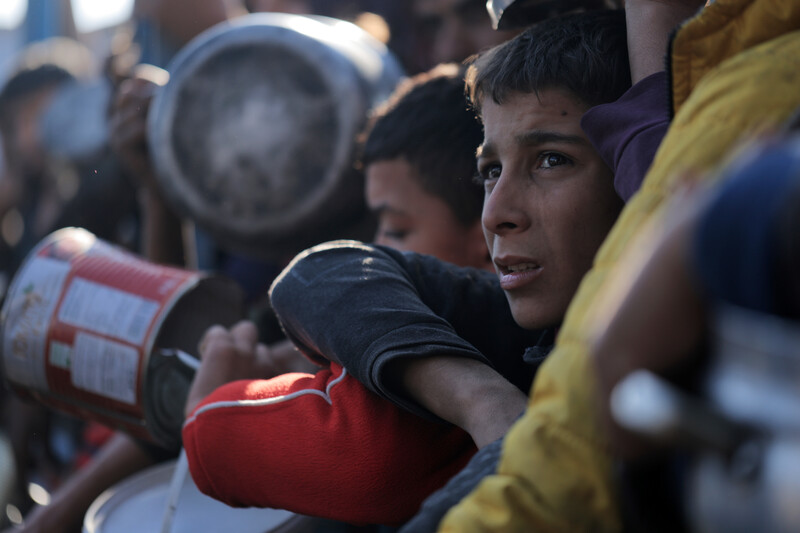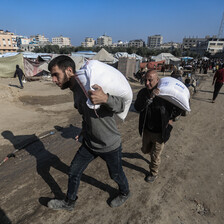The Electronic Intifada 8 February 2025

Children wait to receive food from charities in Khan Younis on 1 January.
APA imagesI live with my sister Hanin in a small tent on the outskirts of al-Zawaida near Deir al-Balah in the central Gaza Strip. Before the ceasefire, trying to survive the constant Israeli attacks consumed all our time.
Hunger made those days pass with slow, unbearable pain.
Hanin, 26, is a mother to two children, Riad, 5, and Imad, 3. She carries the weight of the world on her shoulders while trying to hide her pain behind a smile that fools no one.
Every morning, I wake up to the sound of Riad trying to craft a new toy from sticks and stones. “I’ll make a tomato tree, and we’ll eat from it every day,” he says with a voice full of hope. Imad sits beside him, clapping enthusiastically as if cheering his brother on to turn the dream into reality.
One day in November 2024 we all sat inside our tent, trying to share what little food we had left: A small piece of bread and a bit of olive oil. Imad, too young to grasp the meaning of hunger, stared at the tiny plate in front of him and then at his mother, as if asking why there wasn’t more.
Riad, with his innocent curiosity, looked at me and asked: “Why can’t we eat until we’re full?”
I had no answer.
‘Finding’ a miracle
Suddenly, Hanin stood up and left the tent. I knew she was going to look for something, anything, to feed her children. After a while, she returned, holding a small withered tomato in her hand. She looked at us with a forced smile and said, “I found this in the nearby field. We’ll add it to our dinner.”
She sat on the ground, placed the tomato on a piece of stale bread and began cutting it with extreme care. She treated the tomato as if it were the most precious thing she had. The children gathered around her, their eyes shining with excitement.
She divided the tomato slices among us. Riad took a small piece and looked at it cautiously before asking, “Mama, if I eat it slowly, will it grow bigger?”
Hanin laughed softly and replied,“Yes, Riad, if you eat it with love, it will feel like it’s growing.”
Imad ate his slice of the tomato carefully, as if he were afraid it would vanish too quickly. I noticed the exhaustion in my sister’ eyes and the worry for her children’s future. I realized hunger wasn’t the only weight on her shoulders.
After we finished eating, Riad went outside the tent and started collecting stones and sticks to craft his “tomato tree.” Imad sat beside him, helping arrange the “tomato fruits” made of small rocks.
Finding strength
That night, after the children had fallen asleep, I sat with Hanin outside the tent. The moon illuminated the empty field in front of us. I asked her how she found the strength to keep going.
She answered quietly, “I have no choice. Riad and Imad think the tomato I brought today was a miracle, and I want to believe that too. They don’t understand that tomorrow might bring nothing.”
I had no words to offer her. I just sat beside her, watching the field and wondering if more miracles awaited us.
In the days that followed, Riad and Imad began treating the field outside the tent as if it were a magical farm. They buried seeds they found unsuitable for eating, saying, “When the tomato tree grows, the food will return, and so will Baba.”
Their father, Mahmoud Sammour, is a teacher at Al-Aqsa University. The Israeli military detained him in November 2023 when the family tried to move to the south for safety. He remains a captive in Israeli detention.
I watched Hanin, realizing how her children’s simple dream had turned into something resembling faith for her. Every day, she went out with the boys, watering the ground with the little water we had and whispering a quiet prayer no one else could hear: “Maybe the earth will bloom one day.”
Maybe.
But I knew that Hanin wasn’t just watering the earth. She was nurturing hope in her children’s hearts – a hope that tomorrow might be less cruel and that life, despite everything, could be reborn from a single tomato.
Maha Mahdi is a freelance writer in Gaza.


